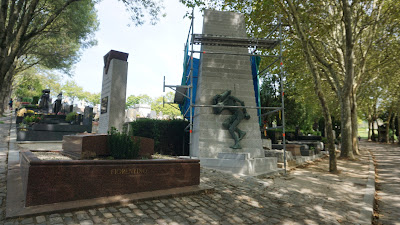 |
| Paris, France. Père-Lachaise Cemetery. Mauthausen Memorial. Gérard Choain, sculptor (1958). Photo: Samuel Gruber 2018. |
 |
| Paris, France. Père-Lachaise Cemetery. Mauthausen Memorial. Gérard Choain, sculptor (1958). Photo: Samuel Gruber 2018. |
Paris: The Mauthausen Concentration Camp Monument at Père Lachaise Cemetery
by Samuel D. Gruber
[Cross-posted form Samuel Gruber's Jewish art & Monuments]
A a recent visit to Paris I spent much of the day at the enormous Père Lachaise Cemetery,
which besides begin a 44-hectare cemetery is also one of Europe's great
outdoor sculpture museums. The list of famous people buried there is
very long, but I was most interested in seeing monuments erected in the
past 70 years commemorating victims of various Nazi concentration and
death camps.
These
monuments, which now number more than a dozen, have been erected by
camp survivors, political organizations, and other other associations
beginning in 1949, when memorials to victims of Auschwitz-Birkenau
(June) an the camp at Neuengamme
(November) were dedicated. Since then additional monuments to victims of the camps at Ravensbrück
(1955), Mauthausen
(1958), Buchenwald-Dora
(1964), Oranienburg-Sachsenhausen
(1970) Dachau
(1985), Flossenbürg
(1988), Buna-Monowitz
Auschwitz III (1993), Bergen-Belsen
(1994), Natzweiler-Struthof
(2004) have been erected. In addtion there is a monument (2006) to the deportees of Convoy 73 which took Jews from Drancy to the Ninth Fort in Kaunas, Lithuania.
I was especially interested in the 1958 Mauthausen (also referred to as Mauthausen-Gusen)
memorial, which I include in my class. This memorial is of note for
many reasons. It is if high artistic merit, but also its location,
materials, explicit narrative, and inscriptions all have meaning in
relation to the rest of the cemetery, the history of art, and specific
acts of Nazi cruelty. As of August 2018, I found the monument, which was created by sculptor Gérard
Choain
(1906-19880, in restoration. Choain himself was a wounded veteran and
was a prisoner of war in German camps from 1939 to 1945. After the war
he created several memorial sculptures.
Formally, the monument is designed for its context in the Père Lachaise
cemetery. It is located near an a corner in section 97, and its tall
granite architecture stands above many of the nearby tombs. At first,
the form of the granite appears similar to an obelisk or tower, which
are frequent motifs employed throughout the cemetery, against which a
stone or bronze allegorical figure are often placed. A good example is
the towering granite tomb of Jacques Léon Clément-Thomas and Claude Lecomte (1875) created by architect Georges-Ernest Coquart and sculptor Louis-Leon
Cugnot. This monument, like many others in the cemetery, presents a
triumphant interpretation of death and entombment. |
| Paris, France. Père-Lachaise Cemetery. Mauthausen Memorial. Gérard Choain, sculptor (1958). Announcement of the design in the 1957 newsletter of the sponsoring survior's group, Amicale de Mauthausen, |
 |
| Paris,
France. Père-Lachaise Cemetery. Mauthausen Memorial. Gérard
Choain, sculptor (1958). Photo: Samuel Gruber 2018. |
No comments:
Post a Comment